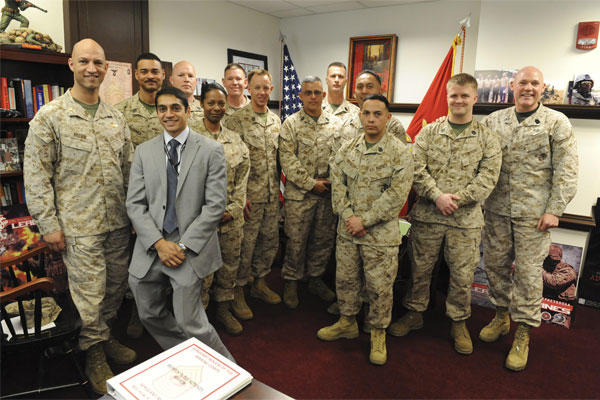FORT GEORGE G. MEADE, Md. -- The Foreign Area Officer program has been in place since 1975, but it wasn’t until 2011 that the program was extended to include staff noncommissioned officers.
Today, the renamed International Affairs Officer Program is an umbrella program that governs the foreign area officer and the regional affairs officer designations. It maintains a pool of well-trained and experienced international specialists who advise in political-military affairs.
The Foreign Area SNCO program’s mission is to identify, select and educate a corps of international affairs Marines for duty with interagency organizations, to improve operations and security assistance efforts with language skills, regional expertise and culture capability.
In 2010, the commandant approved the initiative to increase the capacity of the FAO-RAO population by educating and identifying a cadre of language, regional expertise and culture professionals among the SNCO corps.
FASs maintain SNCO responsibilities and apply LREC skills primarily at the tactical level. FAOs apply LREC skills where they are primarily assigned, in operational and strategic-level staff billets.
“The Marine Corps operates in environments, which require understanding of the complex human terrain, cultural norms and language to facilitate interaction with foreign populations at all levels,” said Master Gunnery Sgt. Ramon Reyes, FAS/RAS program manager.
The Corps is the first service to create a FAS program and employ SNCOs with these foreign area skills; however the Army has recently begun sending Army SNCOs to the joint FAO basic course in Monterey, Calif.
The International Affairs Branch began a 27-month beta test of the program in February 2012, with nine SNCOs.
FAS Marines complete extensive education and training events; they attend Naval Postgraduate School for six months, immersion language training for three months, culture/language study abroad, a two-week information operations capability course, an Intensive Regional Area Studies course and a weeklong security cooperation planners course.
“Once training is complete, the Marines are sent on a utilization tour to units to employ their language, regional expertise and culture skills,” said Reyes.
“Five of the Marines have completed training and are currently at their respective assignments.”
Gunnery Sgt. Richard Plummer recently completed the first utilization tour.
“I have always been fascinated with the various cultures and languages of the world,” said Plummer. “I saw this as a unique opportunity.
“I've learned the seriousness of relationships between people, how building partnerships are more than just a handshake. This process becomes a relationship with very serious duties and responsibilities.”
Plummer said when he first became part of the program, he had no idea what to expect as it was a new, still in the beta-test phase.
“It is always a unique experience transitioning from one unit to another, but even more so when you show up brandishing a new capability that no one has planned for,” he said. “However, it has come to be a billet/capability/resource that is relied upon. We (FAS/FAO community) are finding ourselves more and more at the requested end of messages when units are looking for LREC assistance.”
“As the nation’s force in readiness, the Corps intends to continue to use the FAS program to ensure improved operations and security assistance efforts no matter what contingency lies ahead,” Reyes said.




























